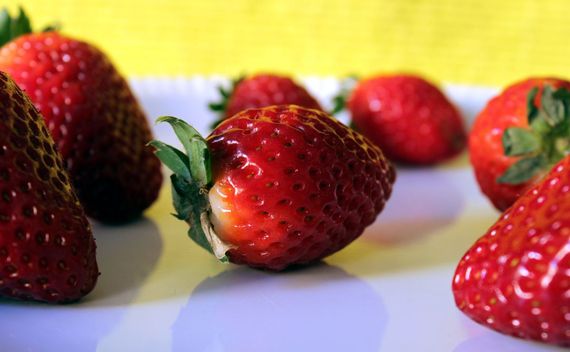
vanessa lollipop, Flickr
Half of the world's food supply is thrown out every year, owing largely to inefficiencies in transport and storage. Food, well, spoils.
Many, many concepts have been floated to attempt to improve the food-waste situation. Some are simple consumer-facing solutions, like convincing people to eat less-than-perfect produce, reducing the size of the average refrigerator, or encouraging people to shop more often and for less food at a time. Some are more complex: improving the shipping infrastructure or refrigerated compartments, genetically modifying plants to spoil slower, and now a new, luxurious-sounding proposal from Tufts University researchers: liquid silk.
Plus: Food Waste: The Next Food Revolution
Liquid silk, referred to by scientists as a "regenerated silk fibroin solution," is basically what it sounds like. Actual silk, if you don't spin it into a fiber for textiles, is an unusual sort of protein that can be dissolved in water to form a solution. That solution has been of a great deal of interest to scientists; it is remarkably strong for its weight, can be easily manipulated, and, interestingly enough, can be safely digested by humans with no ill effects.
Plus: USDA and EPA Announce First-Ever Plan To Reduce Food Waste
The Tufts researchers wanted to see if a silk solution could be used to delay spoilage of fruits; they picked strawberries and bananas because these fruits spoil easily. When strawberries were dipped in this silk solution four times, and then compared with non-silken strawberries after a week, the researchers found that the silk fruit remained bright red, juicy, and fresh, while the control fruit had become dehydrated, soft, and probably unlikely to sell had they been at a supermarket. The silk, though the layer was thinner than the diameter of a human hair, had effectively blocked the environmental stressors that cause fruit to go bad, including carbon dioxide and oxygen.
Plus: Waste Not, Want Not: 10 Ways to Reduce Your Food Waste Footprint
On the other hand, the big question is: What does it taste like? From the study: "The thin, odorless silk coating did not affect fruit texture. Taste was not studied."
Next time, please study the taste of silk-dipped strawberries, scientists. Good start, though.
More from Modern Farmer:
Five-Minute Mentor: Farming Advice from Joel Salatin
Iowa Cartoonist Fired, He Says, For Insulting Big Ag CEOs
Senator Pat Roberts Thinks Chicken Welfare is "Absolutely Ridiculous"
Never Buy a Teacup Pig
Meet Alan Chadwick, The High Priest of Hippie Horticulture
-- This feed and its contents are the property of The Huffington Post, and use is subject to our terms. It may be used for personal consumption, but may not be distributed on a website.
No comments:
Post a Comment